University Nursing Assignment: Self-Efficacy and Student Motivation
VerifiedAdded on 2022/09/28
|10
|2837
|30
Essay
AI Summary
This essay delves into the critical role of self-efficacy and motivation in nursing education, drawing from psychological theories and research. It examines self-efficacy as a conscious drive for achieving meaningful goals, influenced by psychosocial factors, and its importance in teaching and learning. The paper discusses the application of Maslow's hierarchy of needs, Bandura's social cognitive theory, and strategies to enhance self-efficacy through meaningful relationships, emotional intelligence, and positive classroom environments. It explores various sources of self-efficacy, including external incentives, avoidance of losses, intrinsic motivation, curiosity, and autonomy. Furthermore, the essay analyzes the influence of self-efficacy and motivation on teaching and learning, emphasizing mastery and performance goals, and the need for teachers to adapt strategies based on student age and cognitive development. Finally, the paper provides practical applications of self-efficacy concepts within the educational setting, focusing on the importance of teachers fostering a supportive environment that promotes student engagement and academic success.
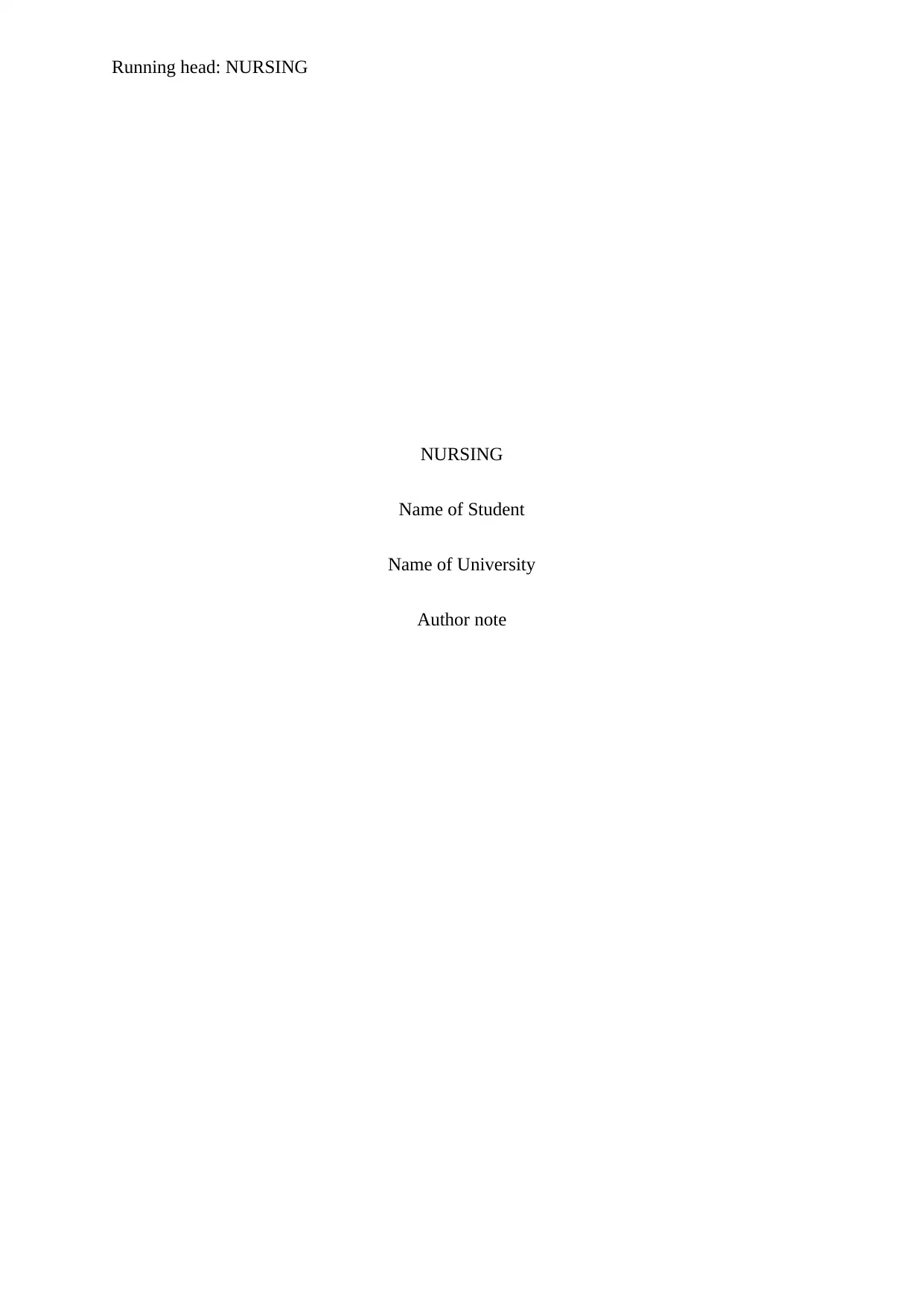
Running head: NURSING
NURSING
Name of Student
Name of University
Author note
NURSING
Name of Student
Name of University
Author note
Paraphrase This Document
Need a fresh take? Get an instant paraphrase of this document with our AI Paraphraser
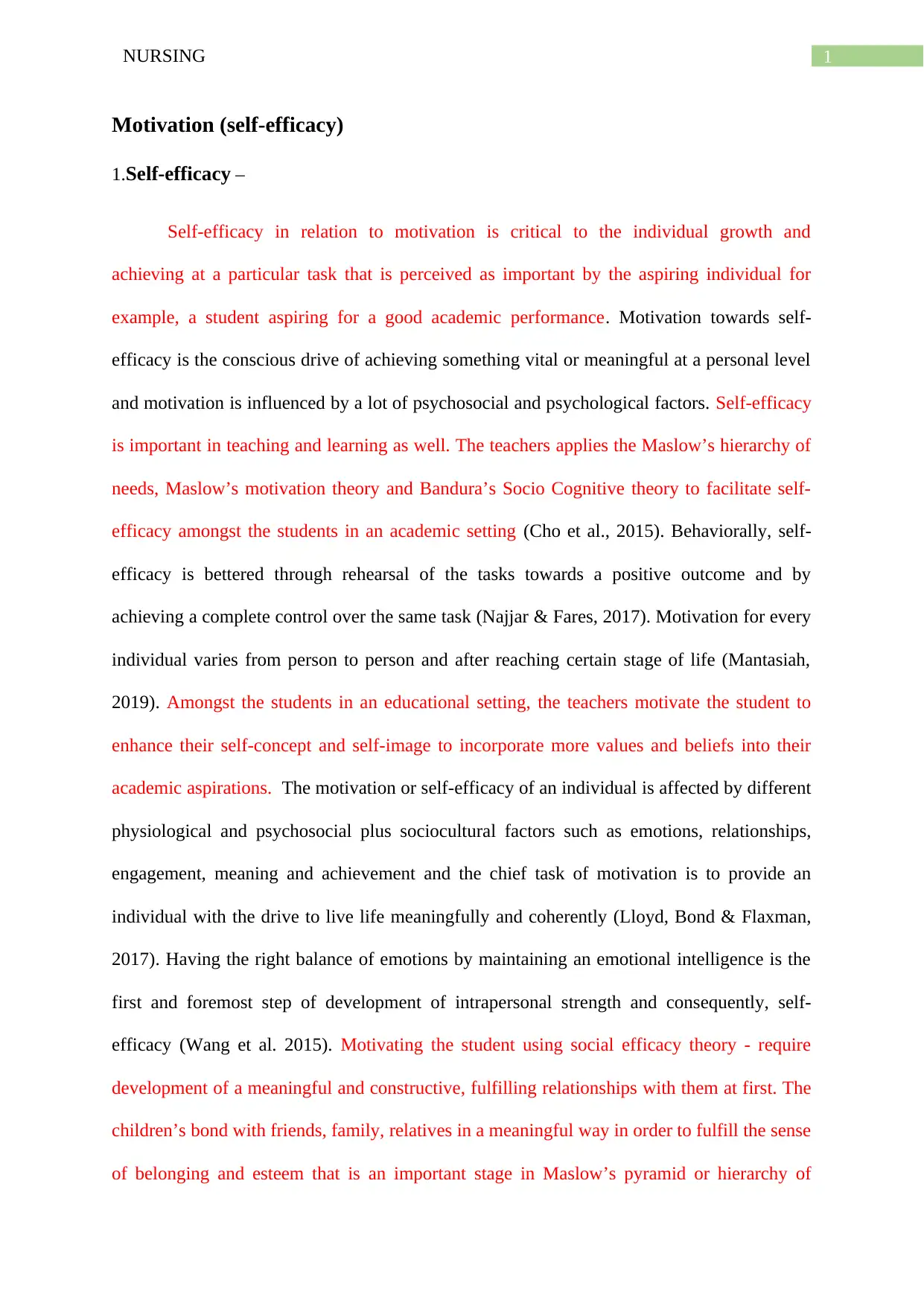
1NURSING
Motivation (self-efficacy)
1.Self-efficacy –
Self-efficacy in relation to motivation is critical to the individual growth and
achieving at a particular task that is perceived as important by the aspiring individual for
example, a student aspiring for a good academic performance. Motivation towards self-
efficacy is the conscious drive of achieving something vital or meaningful at a personal level
and motivation is influenced by a lot of psychosocial and psychological factors. Self-efficacy
is important in teaching and learning as well. The teachers applies the Maslow’s hierarchy of
needs, Maslow’s motivation theory and Bandura’s Socio Cognitive theory to facilitate self-
efficacy amongst the students in an academic setting (Cho et al., 2015). Behaviorally, self-
efficacy is bettered through rehearsal of the tasks towards a positive outcome and by
achieving a complete control over the same task (Najjar & Fares, 2017). Motivation for every
individual varies from person to person and after reaching certain stage of life (Mantasiah,
2019). Amongst the students in an educational setting, the teachers motivate the student to
enhance their self-concept and self-image to incorporate more values and beliefs into their
academic aspirations. The motivation or self-efficacy of an individual is affected by different
physiological and psychosocial plus sociocultural factors such as emotions, relationships,
engagement, meaning and achievement and the chief task of motivation is to provide an
individual with the drive to live life meaningfully and coherently (Lloyd, Bond & Flaxman,
2017). Having the right balance of emotions by maintaining an emotional intelligence is the
first and foremost step of development of intrapersonal strength and consequently, self-
efficacy (Wang et al. 2015). Motivating the student using social efficacy theory - require
development of a meaningful and constructive, fulfilling relationships with them at first. The
children’s bond with friends, family, relatives in a meaningful way in order to fulfill the sense
of belonging and esteem that is an important stage in Maslow’s pyramid or hierarchy of
Motivation (self-efficacy)
1.Self-efficacy –
Self-efficacy in relation to motivation is critical to the individual growth and
achieving at a particular task that is perceived as important by the aspiring individual for
example, a student aspiring for a good academic performance. Motivation towards self-
efficacy is the conscious drive of achieving something vital or meaningful at a personal level
and motivation is influenced by a lot of psychosocial and psychological factors. Self-efficacy
is important in teaching and learning as well. The teachers applies the Maslow’s hierarchy of
needs, Maslow’s motivation theory and Bandura’s Socio Cognitive theory to facilitate self-
efficacy amongst the students in an academic setting (Cho et al., 2015). Behaviorally, self-
efficacy is bettered through rehearsal of the tasks towards a positive outcome and by
achieving a complete control over the same task (Najjar & Fares, 2017). Motivation for every
individual varies from person to person and after reaching certain stage of life (Mantasiah,
2019). Amongst the students in an educational setting, the teachers motivate the student to
enhance their self-concept and self-image to incorporate more values and beliefs into their
academic aspirations. The motivation or self-efficacy of an individual is affected by different
physiological and psychosocial plus sociocultural factors such as emotions, relationships,
engagement, meaning and achievement and the chief task of motivation is to provide an
individual with the drive to live life meaningfully and coherently (Lloyd, Bond & Flaxman,
2017). Having the right balance of emotions by maintaining an emotional intelligence is the
first and foremost step of development of intrapersonal strength and consequently, self-
efficacy (Wang et al. 2015). Motivating the student using social efficacy theory - require
development of a meaningful and constructive, fulfilling relationships with them at first. The
children’s bond with friends, family, relatives in a meaningful way in order to fulfill the sense
of belonging and esteem that is an important stage in Maslow’s pyramid or hierarchy of
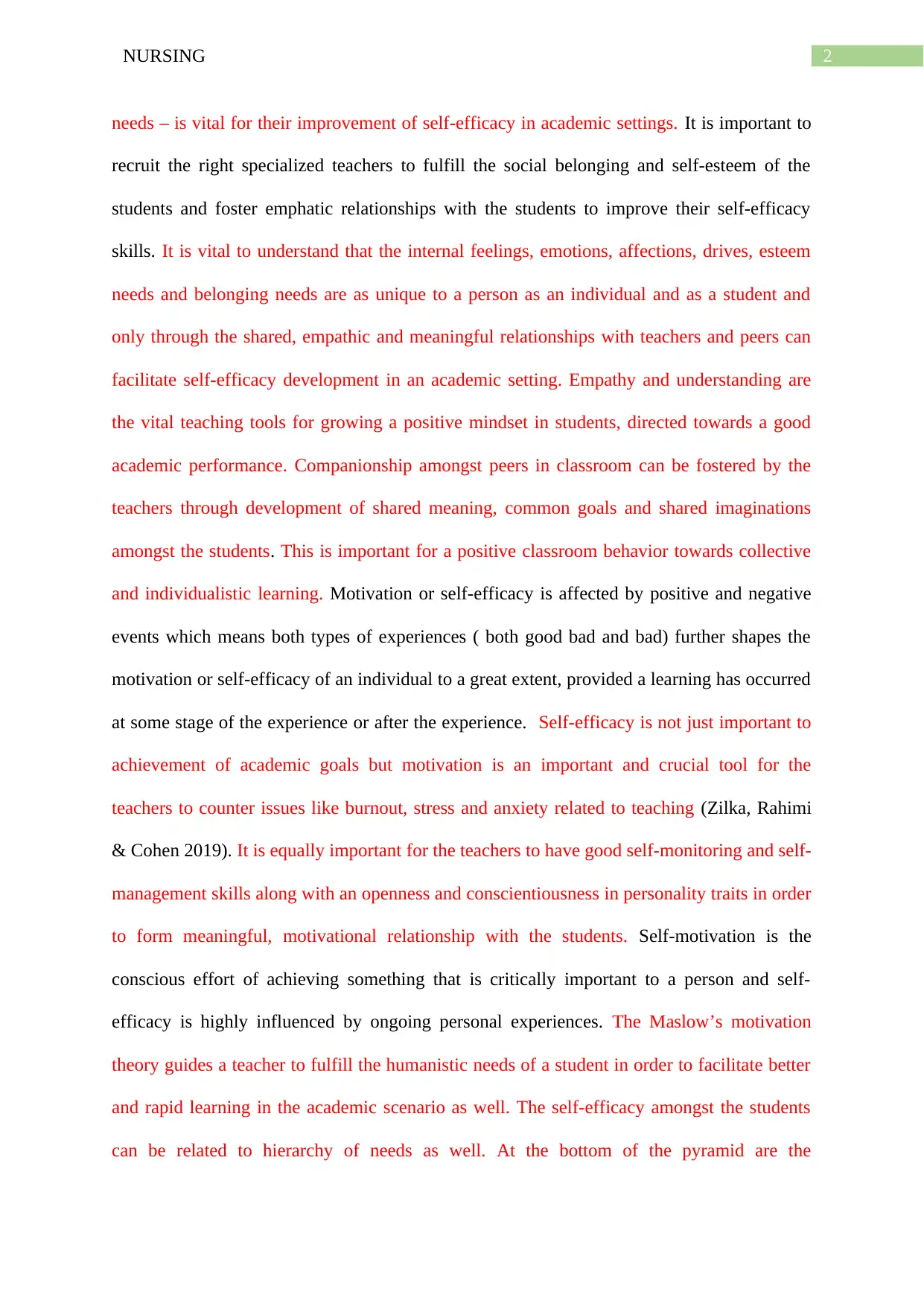
2NURSING
needs – is vital for their improvement of self-efficacy in academic settings. It is important to
recruit the right specialized teachers to fulfill the social belonging and self-esteem of the
students and foster emphatic relationships with the students to improve their self-efficacy
skills. It is vital to understand that the internal feelings, emotions, affections, drives, esteem
needs and belonging needs are as unique to a person as an individual and as a student and
only through the shared, empathic and meaningful relationships with teachers and peers can
facilitate self-efficacy development in an academic setting. Empathy and understanding are
the vital teaching tools for growing a positive mindset in students, directed towards a good
academic performance. Companionship amongst peers in classroom can be fostered by the
teachers through development of shared meaning, common goals and shared imaginations
amongst the students. This is important for a positive classroom behavior towards collective
and individualistic learning. Motivation or self-efficacy is affected by positive and negative
events which means both types of experiences ( both good bad and bad) further shapes the
motivation or self-efficacy of an individual to a great extent, provided a learning has occurred
at some stage of the experience or after the experience. Self-efficacy is not just important to
achievement of academic goals but motivation is an important and crucial tool for the
teachers to counter issues like burnout, stress and anxiety related to teaching (Zilka, Rahimi
& Cohen 2019). It is equally important for the teachers to have good self-monitoring and self-
management skills along with an openness and conscientiousness in personality traits in order
to form meaningful, motivational relationship with the students. Self-motivation is the
conscious effort of achieving something that is critically important to a person and self-
efficacy is highly influenced by ongoing personal experiences. The Maslow’s motivation
theory guides a teacher to fulfill the humanistic needs of a student in order to facilitate better
and rapid learning in the academic scenario as well. The self-efficacy amongst the students
can be related to hierarchy of needs as well. At the bottom of the pyramid are the
needs – is vital for their improvement of self-efficacy in academic settings. It is important to
recruit the right specialized teachers to fulfill the social belonging and self-esteem of the
students and foster emphatic relationships with the students to improve their self-efficacy
skills. It is vital to understand that the internal feelings, emotions, affections, drives, esteem
needs and belonging needs are as unique to a person as an individual and as a student and
only through the shared, empathic and meaningful relationships with teachers and peers can
facilitate self-efficacy development in an academic setting. Empathy and understanding are
the vital teaching tools for growing a positive mindset in students, directed towards a good
academic performance. Companionship amongst peers in classroom can be fostered by the
teachers through development of shared meaning, common goals and shared imaginations
amongst the students. This is important for a positive classroom behavior towards collective
and individualistic learning. Motivation or self-efficacy is affected by positive and negative
events which means both types of experiences ( both good bad and bad) further shapes the
motivation or self-efficacy of an individual to a great extent, provided a learning has occurred
at some stage of the experience or after the experience. Self-efficacy is not just important to
achievement of academic goals but motivation is an important and crucial tool for the
teachers to counter issues like burnout, stress and anxiety related to teaching (Zilka, Rahimi
& Cohen 2019). It is equally important for the teachers to have good self-monitoring and self-
management skills along with an openness and conscientiousness in personality traits in order
to form meaningful, motivational relationship with the students. Self-motivation is the
conscious effort of achieving something that is critically important to a person and self-
efficacy is highly influenced by ongoing personal experiences. The Maslow’s motivation
theory guides a teacher to fulfill the humanistic needs of a student in order to facilitate better
and rapid learning in the academic scenario as well. The self-efficacy amongst the students
can be related to hierarchy of needs as well. At the bottom of the pyramid are the
⊘ This is a preview!⊘
Do you want full access?
Subscribe today to unlock all pages.

Trusted by 1+ million students worldwide
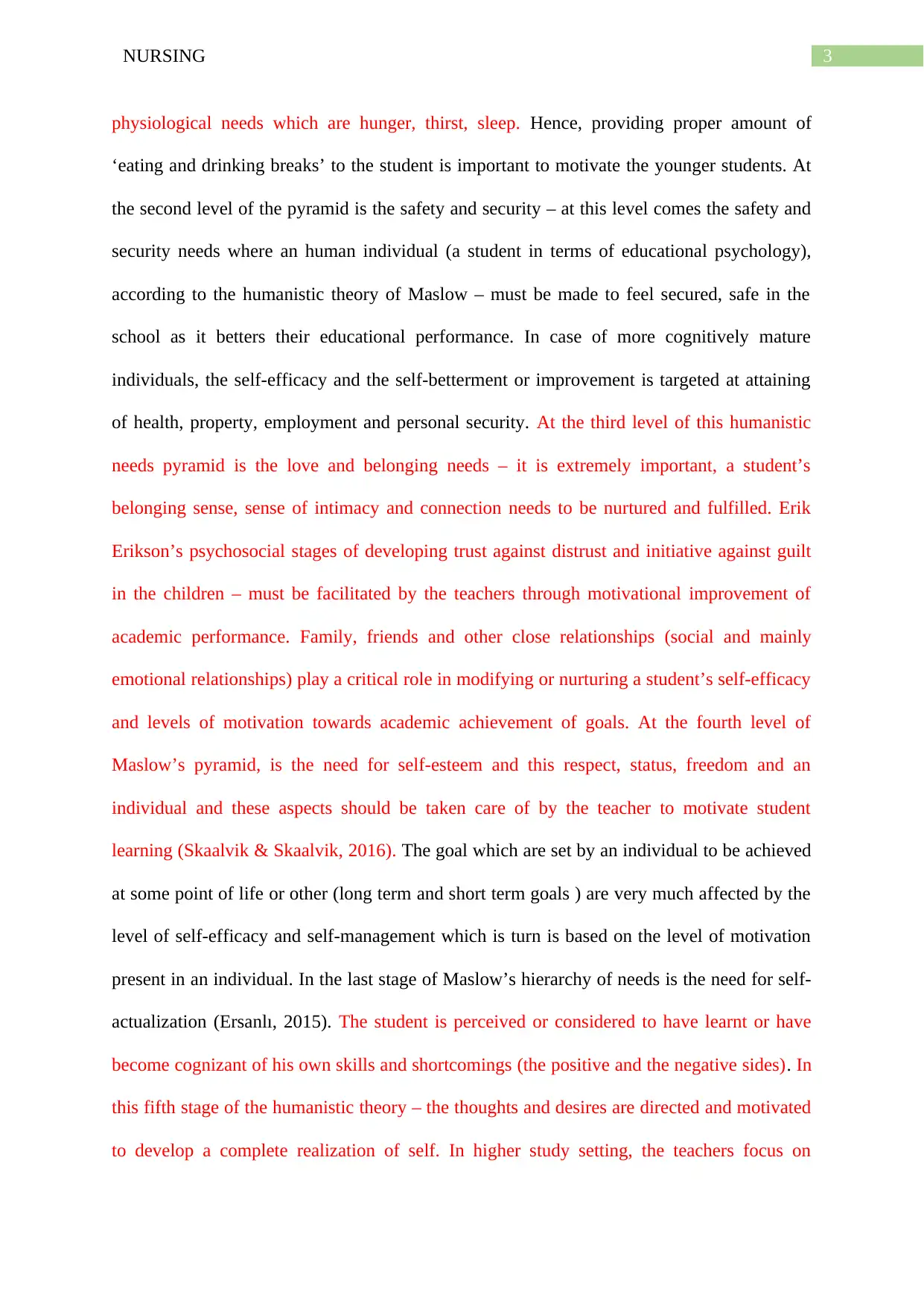
3NURSING
physiological needs which are hunger, thirst, sleep. Hence, providing proper amount of
‘eating and drinking breaks’ to the student is important to motivate the younger students. At
the second level of the pyramid is the safety and security – at this level comes the safety and
security needs where an human individual (a student in terms of educational psychology),
according to the humanistic theory of Maslow – must be made to feel secured, safe in the
school as it betters their educational performance. In case of more cognitively mature
individuals, the self-efficacy and the self-betterment or improvement is targeted at attaining
of health, property, employment and personal security. At the third level of this humanistic
needs pyramid is the love and belonging needs – it is extremely important, a student’s
belonging sense, sense of intimacy and connection needs to be nurtured and fulfilled. Erik
Erikson’s psychosocial stages of developing trust against distrust and initiative against guilt
in the children – must be facilitated by the teachers through motivational improvement of
academic performance. Family, friends and other close relationships (social and mainly
emotional relationships) play a critical role in modifying or nurturing a student’s self-efficacy
and levels of motivation towards academic achievement of goals. At the fourth level of
Maslow’s pyramid, is the need for self-esteem and this respect, status, freedom and an
individual and these aspects should be taken care of by the teacher to motivate student
learning (Skaalvik & Skaalvik, 2016). The goal which are set by an individual to be achieved
at some point of life or other (long term and short term goals ) are very much affected by the
level of self-efficacy and self-management which is turn is based on the level of motivation
present in an individual. In the last stage of Maslow’s hierarchy of needs is the need for self-
actualization (Ersanlı, 2015). The student is perceived or considered to have learnt or have
become cognizant of his own skills and shortcomings (the positive and the negative sides). In
this fifth stage of the humanistic theory – the thoughts and desires are directed and motivated
to develop a complete realization of self. In higher study setting, the teachers focus on
physiological needs which are hunger, thirst, sleep. Hence, providing proper amount of
‘eating and drinking breaks’ to the student is important to motivate the younger students. At
the second level of the pyramid is the safety and security – at this level comes the safety and
security needs where an human individual (a student in terms of educational psychology),
according to the humanistic theory of Maslow – must be made to feel secured, safe in the
school as it betters their educational performance. In case of more cognitively mature
individuals, the self-efficacy and the self-betterment or improvement is targeted at attaining
of health, property, employment and personal security. At the third level of this humanistic
needs pyramid is the love and belonging needs – it is extremely important, a student’s
belonging sense, sense of intimacy and connection needs to be nurtured and fulfilled. Erik
Erikson’s psychosocial stages of developing trust against distrust and initiative against guilt
in the children – must be facilitated by the teachers through motivational improvement of
academic performance. Family, friends and other close relationships (social and mainly
emotional relationships) play a critical role in modifying or nurturing a student’s self-efficacy
and levels of motivation towards academic achievement of goals. At the fourth level of
Maslow’s pyramid, is the need for self-esteem and this respect, status, freedom and an
individual and these aspects should be taken care of by the teacher to motivate student
learning (Skaalvik & Skaalvik, 2016). The goal which are set by an individual to be achieved
at some point of life or other (long term and short term goals ) are very much affected by the
level of self-efficacy and self-management which is turn is based on the level of motivation
present in an individual. In the last stage of Maslow’s hierarchy of needs is the need for self-
actualization (Ersanlı, 2015). The student is perceived or considered to have learnt or have
become cognizant of his own skills and shortcomings (the positive and the negative sides). In
this fifth stage of the humanistic theory – the thoughts and desires are directed and motivated
to develop a complete realization of self. In higher study setting, the teachers focus on
Paraphrase This Document
Need a fresh take? Get an instant paraphrase of this document with our AI Paraphraser
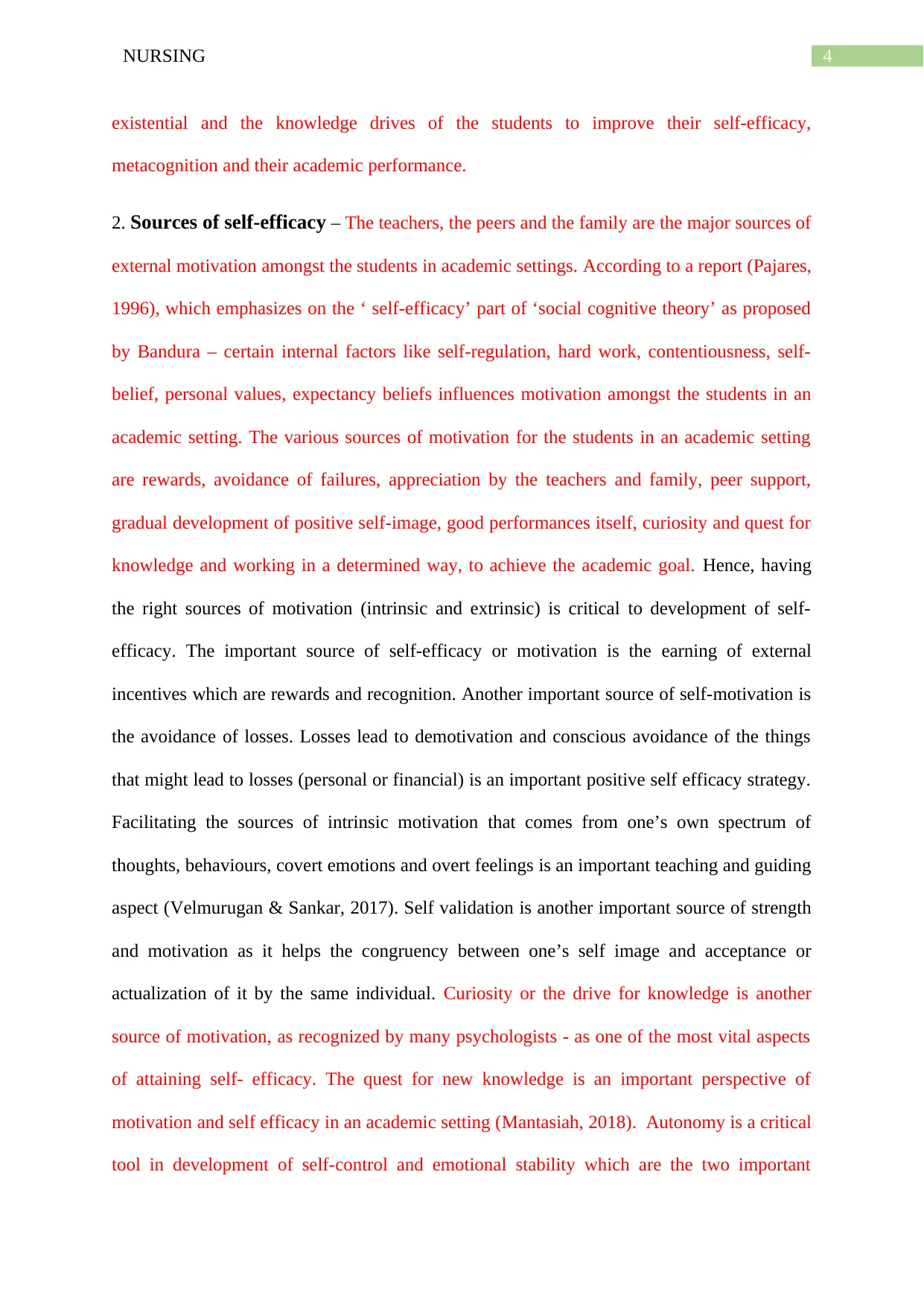
4NURSING
existential and the knowledge drives of the students to improve their self-efficacy,
metacognition and their academic performance.
2. Sources of self-efficacy – The teachers, the peers and the family are the major sources of
external motivation amongst the students in academic settings. According to a report (Pajares,
1996), which emphasizes on the ‘ self-efficacy’ part of ‘social cognitive theory’ as proposed
by Bandura – certain internal factors like self-regulation, hard work, contentiousness, self-
belief, personal values, expectancy beliefs influences motivation amongst the students in an
academic setting. The various sources of motivation for the students in an academic setting
are rewards, avoidance of failures, appreciation by the teachers and family, peer support,
gradual development of positive self-image, good performances itself, curiosity and quest for
knowledge and working in a determined way, to achieve the academic goal. Hence, having
the right sources of motivation (intrinsic and extrinsic) is critical to development of self-
efficacy. The important source of self-efficacy or motivation is the earning of external
incentives which are rewards and recognition. Another important source of self-motivation is
the avoidance of losses. Losses lead to demotivation and conscious avoidance of the things
that might lead to losses (personal or financial) is an important positive self efficacy strategy.
Facilitating the sources of intrinsic motivation that comes from one’s own spectrum of
thoughts, behaviours, covert emotions and overt feelings is an important teaching and guiding
aspect (Velmurugan & Sankar, 2017). Self validation is another important source of strength
and motivation as it helps the congruency between one’s self image and acceptance or
actualization of it by the same individual. Curiosity or the drive for knowledge is another
source of motivation, as recognized by many psychologists - as one of the most vital aspects
of attaining self- efficacy. The quest for new knowledge is an important perspective of
motivation and self efficacy in an academic setting (Mantasiah, 2018). Autonomy is a critical
tool in development of self-control and emotional stability which are the two important
existential and the knowledge drives of the students to improve their self-efficacy,
metacognition and their academic performance.
2. Sources of self-efficacy – The teachers, the peers and the family are the major sources of
external motivation amongst the students in academic settings. According to a report (Pajares,
1996), which emphasizes on the ‘ self-efficacy’ part of ‘social cognitive theory’ as proposed
by Bandura – certain internal factors like self-regulation, hard work, contentiousness, self-
belief, personal values, expectancy beliefs influences motivation amongst the students in an
academic setting. The various sources of motivation for the students in an academic setting
are rewards, avoidance of failures, appreciation by the teachers and family, peer support,
gradual development of positive self-image, good performances itself, curiosity and quest for
knowledge and working in a determined way, to achieve the academic goal. Hence, having
the right sources of motivation (intrinsic and extrinsic) is critical to development of self-
efficacy. The important source of self-efficacy or motivation is the earning of external
incentives which are rewards and recognition. Another important source of self-motivation is
the avoidance of losses. Losses lead to demotivation and conscious avoidance of the things
that might lead to losses (personal or financial) is an important positive self efficacy strategy.
Facilitating the sources of intrinsic motivation that comes from one’s own spectrum of
thoughts, behaviours, covert emotions and overt feelings is an important teaching and guiding
aspect (Velmurugan & Sankar, 2017). Self validation is another important source of strength
and motivation as it helps the congruency between one’s self image and acceptance or
actualization of it by the same individual. Curiosity or the drive for knowledge is another
source of motivation, as recognized by many psychologists - as one of the most vital aspects
of attaining self- efficacy. The quest for new knowledge is an important perspective of
motivation and self efficacy in an academic setting (Mantasiah, 2018). Autonomy is a critical
tool in development of self-control and emotional stability which are the two important
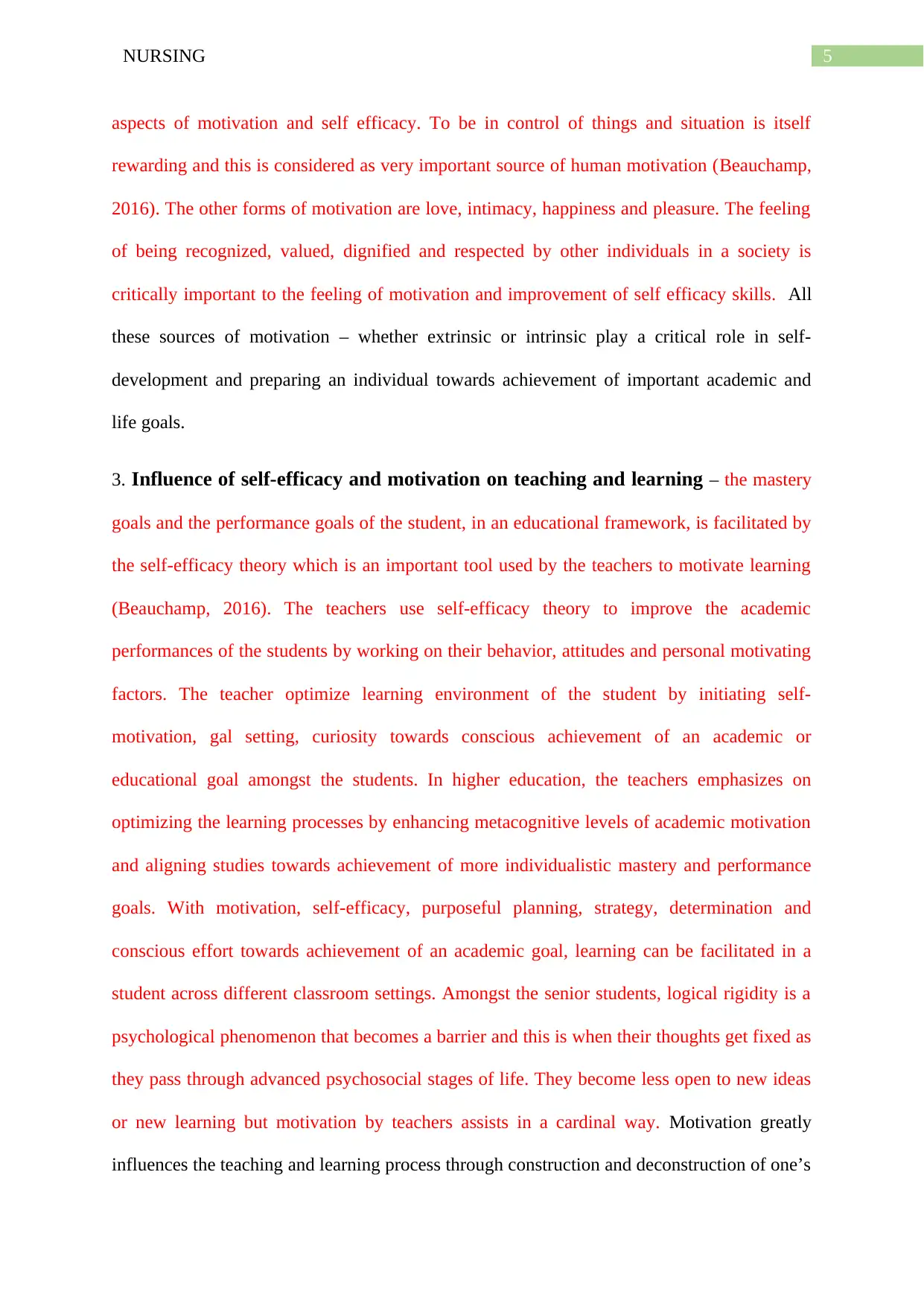
5NURSING
aspects of motivation and self efficacy. To be in control of things and situation is itself
rewarding and this is considered as very important source of human motivation (Beauchamp,
2016). The other forms of motivation are love, intimacy, happiness and pleasure. The feeling
of being recognized, valued, dignified and respected by other individuals in a society is
critically important to the feeling of motivation and improvement of self efficacy skills. All
these sources of motivation – whether extrinsic or intrinsic play a critical role in self-
development and preparing an individual towards achievement of important academic and
life goals.
3. Influence of self-efficacy and motivation on teaching and learning – the mastery
goals and the performance goals of the student, in an educational framework, is facilitated by
the self-efficacy theory which is an important tool used by the teachers to motivate learning
(Beauchamp, 2016). The teachers use self-efficacy theory to improve the academic
performances of the students by working on their behavior, attitudes and personal motivating
factors. The teacher optimize learning environment of the student by initiating self-
motivation, gal setting, curiosity towards conscious achievement of an academic or
educational goal amongst the students. In higher education, the teachers emphasizes on
optimizing the learning processes by enhancing metacognitive levels of academic motivation
and aligning studies towards achievement of more individualistic mastery and performance
goals. With motivation, self-efficacy, purposeful planning, strategy, determination and
conscious effort towards achievement of an academic goal, learning can be facilitated in a
student across different classroom settings. Amongst the senior students, logical rigidity is a
psychological phenomenon that becomes a barrier and this is when their thoughts get fixed as
they pass through advanced psychosocial stages of life. They become less open to new ideas
or new learning but motivation by teachers assists in a cardinal way. Motivation greatly
influences the teaching and learning process through construction and deconstruction of one’s
aspects of motivation and self efficacy. To be in control of things and situation is itself
rewarding and this is considered as very important source of human motivation (Beauchamp,
2016). The other forms of motivation are love, intimacy, happiness and pleasure. The feeling
of being recognized, valued, dignified and respected by other individuals in a society is
critically important to the feeling of motivation and improvement of self efficacy skills. All
these sources of motivation – whether extrinsic or intrinsic play a critical role in self-
development and preparing an individual towards achievement of important academic and
life goals.
3. Influence of self-efficacy and motivation on teaching and learning – the mastery
goals and the performance goals of the student, in an educational framework, is facilitated by
the self-efficacy theory which is an important tool used by the teachers to motivate learning
(Beauchamp, 2016). The teachers use self-efficacy theory to improve the academic
performances of the students by working on their behavior, attitudes and personal motivating
factors. The teacher optimize learning environment of the student by initiating self-
motivation, gal setting, curiosity towards conscious achievement of an academic or
educational goal amongst the students. In higher education, the teachers emphasizes on
optimizing the learning processes by enhancing metacognitive levels of academic motivation
and aligning studies towards achievement of more individualistic mastery and performance
goals. With motivation, self-efficacy, purposeful planning, strategy, determination and
conscious effort towards achievement of an academic goal, learning can be facilitated in a
student across different classroom settings. Amongst the senior students, logical rigidity is a
psychological phenomenon that becomes a barrier and this is when their thoughts get fixed as
they pass through advanced psychosocial stages of life. They become less open to new ideas
or new learning but motivation by teachers assists in a cardinal way. Motivation greatly
influences the teaching and learning process through construction and deconstruction of one’s
⊘ This is a preview!⊘
Do you want full access?
Subscribe today to unlock all pages.

Trusted by 1+ million students worldwide
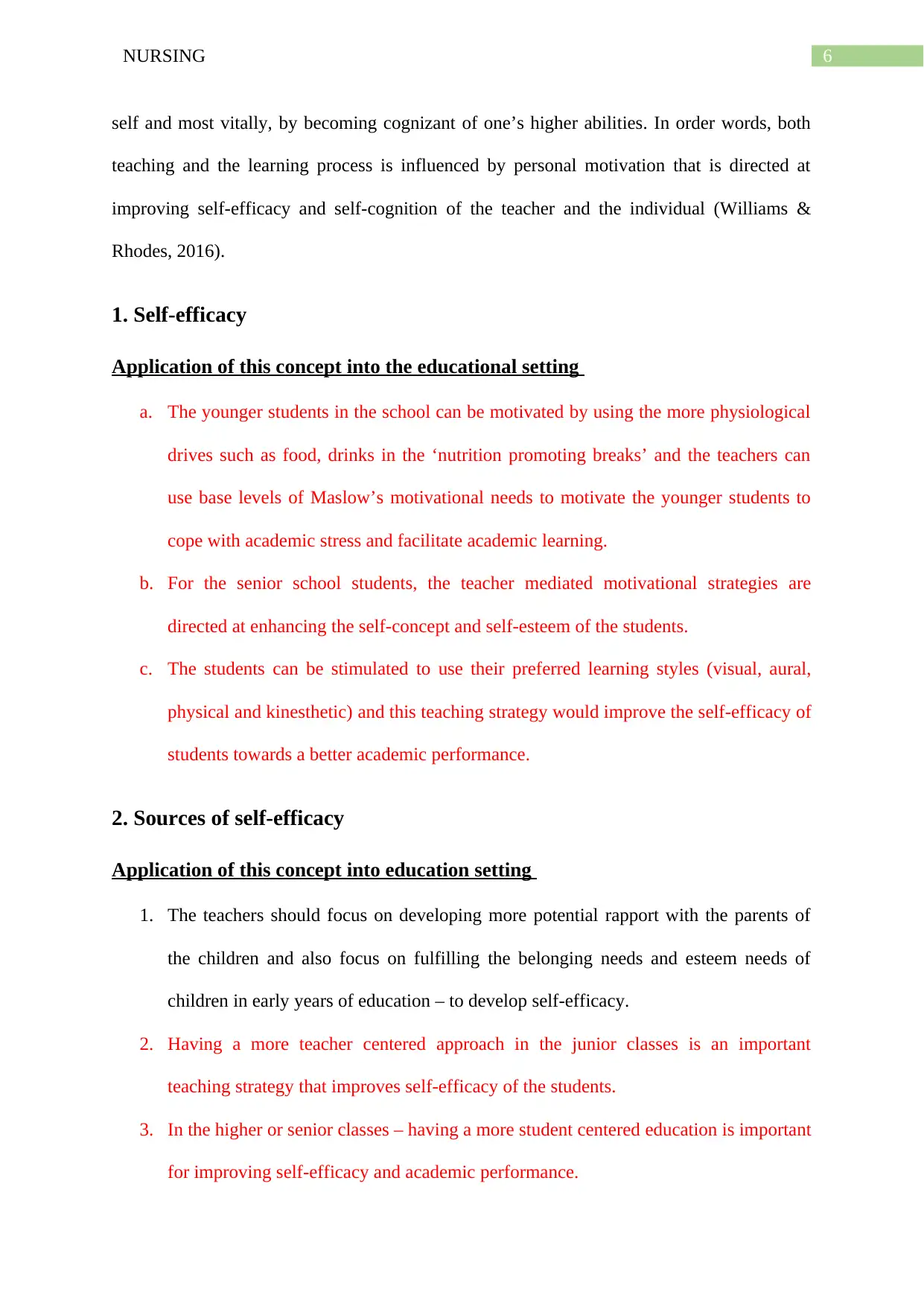
6NURSING
self and most vitally, by becoming cognizant of one’s higher abilities. In order words, both
teaching and the learning process is influenced by personal motivation that is directed at
improving self-efficacy and self-cognition of the teacher and the individual (Williams &
Rhodes, 2016).
1. Self-efficacy
Application of this concept into the educational setting
a. The younger students in the school can be motivated by using the more physiological
drives such as food, drinks in the ‘nutrition promoting breaks’ and the teachers can
use base levels of Maslow’s motivational needs to motivate the younger students to
cope with academic stress and facilitate academic learning.
b. For the senior school students, the teacher mediated motivational strategies are
directed at enhancing the self-concept and self-esteem of the students.
c. The students can be stimulated to use their preferred learning styles (visual, aural,
physical and kinesthetic) and this teaching strategy would improve the self-efficacy of
students towards a better academic performance.
2. Sources of self-efficacy
Application of this concept into education setting
1. The teachers should focus on developing more potential rapport with the parents of
the children and also focus on fulfilling the belonging needs and esteem needs of
children in early years of education – to develop self-efficacy.
2. Having a more teacher centered approach in the junior classes is an important
teaching strategy that improves self-efficacy of the students.
3. In the higher or senior classes – having a more student centered education is important
for improving self-efficacy and academic performance.
self and most vitally, by becoming cognizant of one’s higher abilities. In order words, both
teaching and the learning process is influenced by personal motivation that is directed at
improving self-efficacy and self-cognition of the teacher and the individual (Williams &
Rhodes, 2016).
1. Self-efficacy
Application of this concept into the educational setting
a. The younger students in the school can be motivated by using the more physiological
drives such as food, drinks in the ‘nutrition promoting breaks’ and the teachers can
use base levels of Maslow’s motivational needs to motivate the younger students to
cope with academic stress and facilitate academic learning.
b. For the senior school students, the teacher mediated motivational strategies are
directed at enhancing the self-concept and self-esteem of the students.
c. The students can be stimulated to use their preferred learning styles (visual, aural,
physical and kinesthetic) and this teaching strategy would improve the self-efficacy of
students towards a better academic performance.
2. Sources of self-efficacy
Application of this concept into education setting
1. The teachers should focus on developing more potential rapport with the parents of
the children and also focus on fulfilling the belonging needs and esteem needs of
children in early years of education – to develop self-efficacy.
2. Having a more teacher centered approach in the junior classes is an important
teaching strategy that improves self-efficacy of the students.
3. In the higher or senior classes – having a more student centered education is important
for improving self-efficacy and academic performance.
Paraphrase This Document
Need a fresh take? Get an instant paraphrase of this document with our AI Paraphraser
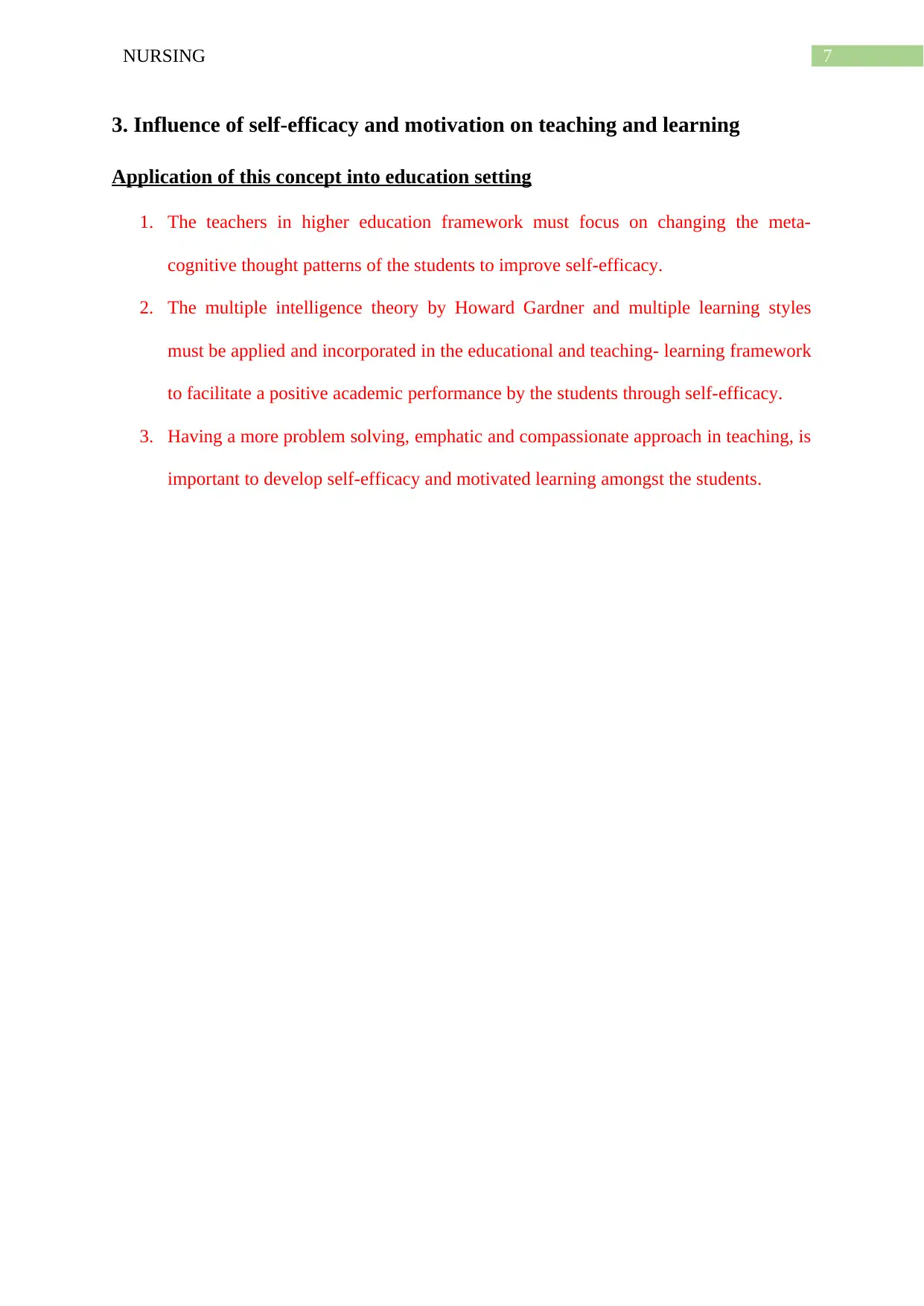
7NURSING
3. Influence of self-efficacy and motivation on teaching and learning
Application of this concept into education setting
1. The teachers in higher education framework must focus on changing the meta-
cognitive thought patterns of the students to improve self-efficacy.
2. The multiple intelligence theory by Howard Gardner and multiple learning styles
must be applied and incorporated in the educational and teaching- learning framework
to facilitate a positive academic performance by the students through self-efficacy.
3. Having a more problem solving, emphatic and compassionate approach in teaching, is
important to develop self-efficacy and motivated learning amongst the students.
3. Influence of self-efficacy and motivation on teaching and learning
Application of this concept into education setting
1. The teachers in higher education framework must focus on changing the meta-
cognitive thought patterns of the students to improve self-efficacy.
2. The multiple intelligence theory by Howard Gardner and multiple learning styles
must be applied and incorporated in the educational and teaching- learning framework
to facilitate a positive academic performance by the students through self-efficacy.
3. Having a more problem solving, emphatic and compassionate approach in teaching, is
important to develop self-efficacy and motivated learning amongst the students.
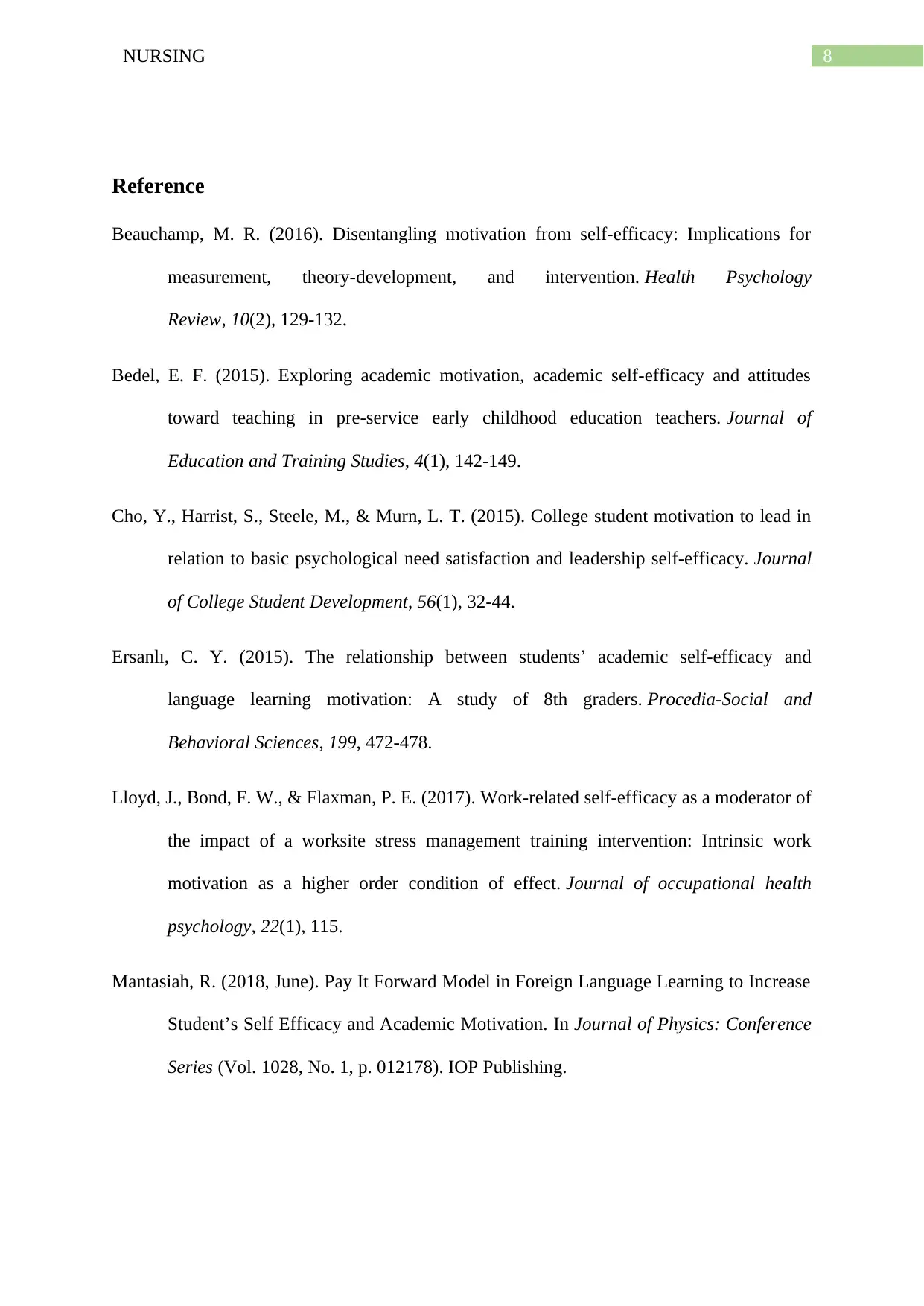
8NURSING
Reference
Beauchamp, M. R. (2016). Disentangling motivation from self-efficacy: Implications for
measurement, theory-development, and intervention. Health Psychology
Review, 10(2), 129-132.
Bedel, E. F. (2015). Exploring academic motivation, academic self-efficacy and attitudes
toward teaching in pre-service early childhood education teachers. Journal of
Education and Training Studies, 4(1), 142-149.
Cho, Y., Harrist, S., Steele, M., & Murn, L. T. (2015). College student motivation to lead in
relation to basic psychological need satisfaction and leadership self-efficacy. Journal
of College Student Development, 56(1), 32-44.
Ersanlı, C. Y. (2015). The relationship between students’ academic self-efficacy and
language learning motivation: A study of 8th graders. Procedia-Social and
Behavioral Sciences, 199, 472-478.
Lloyd, J., Bond, F. W., & Flaxman, P. E. (2017). Work-related self-efficacy as a moderator of
the impact of a worksite stress management training intervention: Intrinsic work
motivation as a higher order condition of effect. Journal of occupational health
psychology, 22(1), 115.
Mantasiah, R. (2018, June). Pay It Forward Model in Foreign Language Learning to Increase
Student’s Self Efficacy and Academic Motivation. In Journal of Physics: Conference
Series (Vol. 1028, No. 1, p. 012178). IOP Publishing.
Reference
Beauchamp, M. R. (2016). Disentangling motivation from self-efficacy: Implications for
measurement, theory-development, and intervention. Health Psychology
Review, 10(2), 129-132.
Bedel, E. F. (2015). Exploring academic motivation, academic self-efficacy and attitudes
toward teaching in pre-service early childhood education teachers. Journal of
Education and Training Studies, 4(1), 142-149.
Cho, Y., Harrist, S., Steele, M., & Murn, L. T. (2015). College student motivation to lead in
relation to basic psychological need satisfaction and leadership self-efficacy. Journal
of College Student Development, 56(1), 32-44.
Ersanlı, C. Y. (2015). The relationship between students’ academic self-efficacy and
language learning motivation: A study of 8th graders. Procedia-Social and
Behavioral Sciences, 199, 472-478.
Lloyd, J., Bond, F. W., & Flaxman, P. E. (2017). Work-related self-efficacy as a moderator of
the impact of a worksite stress management training intervention: Intrinsic work
motivation as a higher order condition of effect. Journal of occupational health
psychology, 22(1), 115.
Mantasiah, R. (2018, June). Pay It Forward Model in Foreign Language Learning to Increase
Student’s Self Efficacy and Academic Motivation. In Journal of Physics: Conference
Series (Vol. 1028, No. 1, p. 012178). IOP Publishing.
⊘ This is a preview!⊘
Do you want full access?
Subscribe today to unlock all pages.

Trusted by 1+ million students worldwide
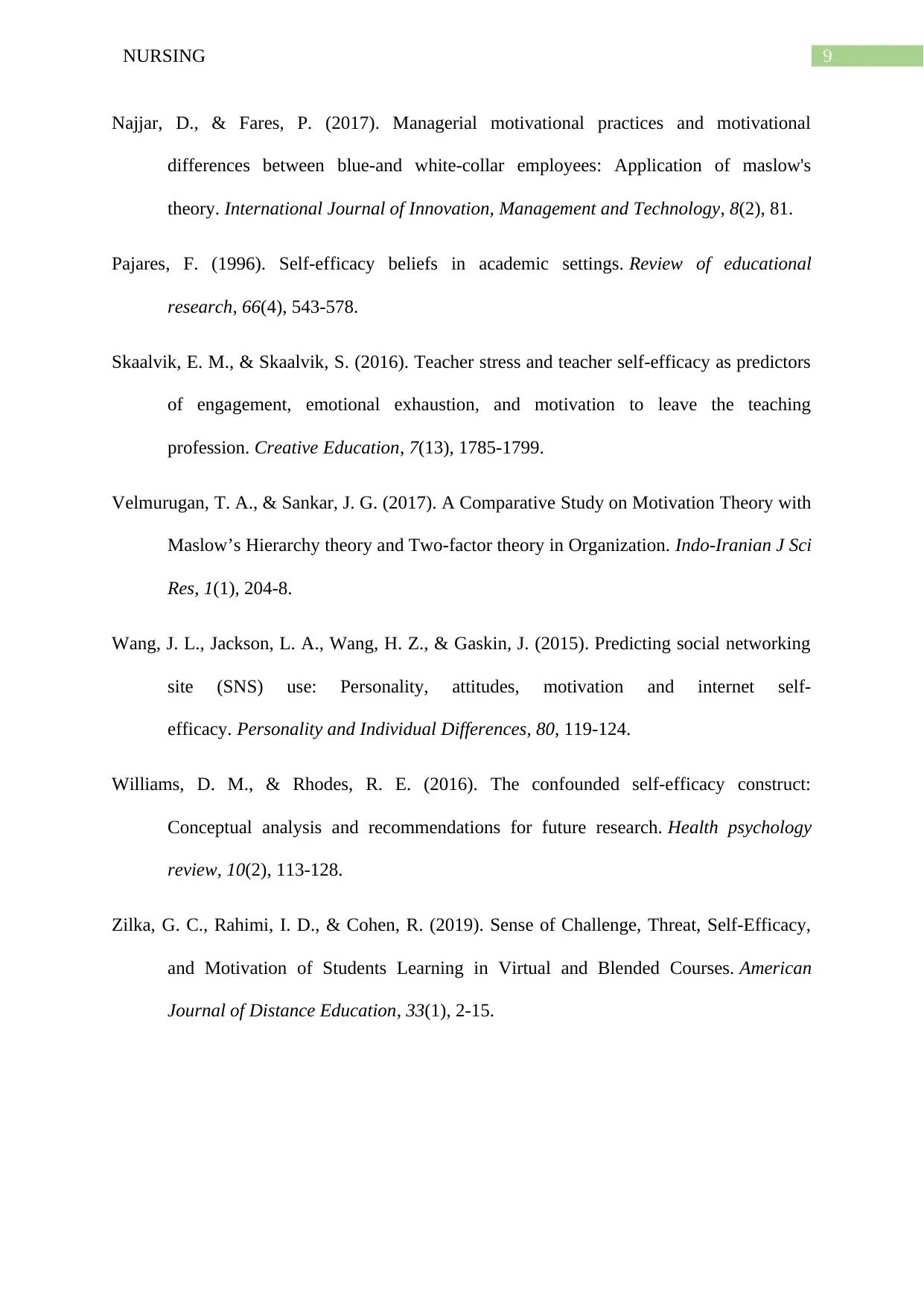
9NURSING
Najjar, D., & Fares, P. (2017). Managerial motivational practices and motivational
differences between blue-and white-collar employees: Application of maslow's
theory. International Journal of Innovation, Management and Technology, 8(2), 81.
Pajares, F. (1996). Self-efficacy beliefs in academic settings. Review of educational
research, 66(4), 543-578.
Skaalvik, E. M., & Skaalvik, S. (2016). Teacher stress and teacher self-efficacy as predictors
of engagement, emotional exhaustion, and motivation to leave the teaching
profession. Creative Education, 7(13), 1785-1799.
Velmurugan, T. A., & Sankar, J. G. (2017). A Comparative Study on Motivation Theory with
Maslow’s Hierarchy theory and Two-factor theory in Organization. Indo-Iranian J Sci
Res, 1(1), 204-8.
Wang, J. L., Jackson, L. A., Wang, H. Z., & Gaskin, J. (2015). Predicting social networking
site (SNS) use: Personality, attitudes, motivation and internet self-
efficacy. Personality and Individual Differences, 80, 119-124.
Williams, D. M., & Rhodes, R. E. (2016). The confounded self-efficacy construct:
Conceptual analysis and recommendations for future research. Health psychology
review, 10(2), 113-128.
Zilka, G. C., Rahimi, I. D., & Cohen, R. (2019). Sense of Challenge, Threat, Self-Efficacy,
and Motivation of Students Learning in Virtual and Blended Courses. American
Journal of Distance Education, 33(1), 2-15.
Najjar, D., & Fares, P. (2017). Managerial motivational practices and motivational
differences between blue-and white-collar employees: Application of maslow's
theory. International Journal of Innovation, Management and Technology, 8(2), 81.
Pajares, F. (1996). Self-efficacy beliefs in academic settings. Review of educational
research, 66(4), 543-578.
Skaalvik, E. M., & Skaalvik, S. (2016). Teacher stress and teacher self-efficacy as predictors
of engagement, emotional exhaustion, and motivation to leave the teaching
profession. Creative Education, 7(13), 1785-1799.
Velmurugan, T. A., & Sankar, J. G. (2017). A Comparative Study on Motivation Theory with
Maslow’s Hierarchy theory and Two-factor theory in Organization. Indo-Iranian J Sci
Res, 1(1), 204-8.
Wang, J. L., Jackson, L. A., Wang, H. Z., & Gaskin, J. (2015). Predicting social networking
site (SNS) use: Personality, attitudes, motivation and internet self-
efficacy. Personality and Individual Differences, 80, 119-124.
Williams, D. M., & Rhodes, R. E. (2016). The confounded self-efficacy construct:
Conceptual analysis and recommendations for future research. Health psychology
review, 10(2), 113-128.
Zilka, G. C., Rahimi, I. D., & Cohen, R. (2019). Sense of Challenge, Threat, Self-Efficacy,
and Motivation of Students Learning in Virtual and Blended Courses. American
Journal of Distance Education, 33(1), 2-15.
1 out of 10
Related Documents
Your All-in-One AI-Powered Toolkit for Academic Success.
+13062052269
info@desklib.com
Available 24*7 on WhatsApp / Email
![[object Object]](/_next/static/media/star-bottom.7253800d.svg)
Unlock your academic potential
Copyright © 2020–2026 A2Z Services. All Rights Reserved. Developed and managed by ZUCOL.




